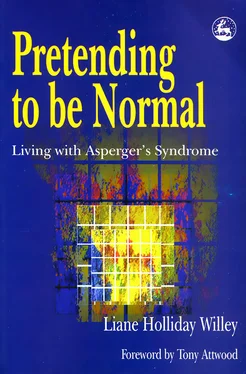Liane Holliday Willey - Pretending to be Normal
Здесь есть возможность читать онлайн «Liane Holliday Willey - Pretending to be Normal» весь текст электронной книги совершенно бесплатно (целиком полную версию без сокращений). В некоторых случаях можно слушать аудио, скачать через торрент в формате fb2 и присутствует краткое содержание. Город: London, Год выпуска: 2000, ISBN: 2000, Издательство: Jessika Kingsley Publishers, Жанр: Психология, Биографии и Мемуары, на английском языке. Описание произведения, (предисловие) а так же отзывы посетителей доступны на портале библиотеки ЛибКат.
- Название:Pretending to be Normal
- Автор:
- Издательство:Jessika Kingsley Publishers
- Жанр:
- Год:2000
- Город:London
- ISBN:1 85302 577 1
- Рейтинг книги:4 / 5. Голосов: 1
-
Избранное:Добавить в избранное
- Отзывы:
-
Ваша оценка:
- 80
- 1
- 2
- 3
- 4
- 5
Pretending to be Normal: краткое содержание, описание и аннотация
Предлагаем к чтению аннотацию, описание, краткое содержание или предисловие (зависит от того, что написал сам автор книги «Pretending to be Normal»). Если вы не нашли необходимую информацию о книге — напишите в комментариях, мы постараемся отыскать её.
Pretending to be Normal — читать онлайн бесплатно полную книгу (весь текст) целиком
Ниже представлен текст книги, разбитый по страницам. Система сохранения места последней прочитанной страницы, позволяет с удобством читать онлайн бесплатно книгу «Pretending to be Normal», без необходимости каждый раз заново искать на чём Вы остановились. Поставьте закладку, и сможете в любой момент перейти на страницу, на которой закончили чтение.
Интервал:
Закладка:
These days, I try to remind myself that though each of my children are very different little beings, I am me and only so capable of flexibility. Within that framework, I then try to give each child what she needs, knowing those needs will often be more than I alone can provide for. In other words, I have learned to accept the fact that I will make mistakes at nearly every turn, but that those mistakes can be softened if I am honest about who I am to my girls. In many ways, it is easier for me to parent my AS child. I know how to relate to her, I know how to show her where to go. I try to teach her to do the kinds of things that help me navigate my way through the regular world. I try to get her to wear earplugs in public or sunglasses in bright light. I try to teach her to very literally bite her lip when she feels she might be about to say something the least bit rude or offensive. Not surprisingly, I have found I am able to rely on a more sophisticated set of learned behaviors than she is able to comprehend at this point in her young seven-year-old life. For instance, I have no difficulty plugging my ears in public or wearing sunglasses indoors and in the evening. I no longer feel odd when I realize my language is yielding to pedantic speech. I openly enjoy talking to myself and never hesitate to do so, even though I now know this is not a particularly acceptable behavior. I will often assert my annoyance in public places, ranting about everything from the loud lights to the sharp sounds to the obtrusive smells and obnoxious behaviors of others. And I have long since given up trying to memorize or understand anything that, by its nature, cannot have a concrete picture attached to its meaning. I no longer apologize when I miss a joke or misplace someone else’s convoluted logic. I have gotten used to me. But I am in middle age. What I need to learn to hope for is the thought that I can help my daughter develop the individualized coping skills she will need to find her own comfort zone.
I know now that her answers will be different from mine in large part because she is far more self-aware than I was at her age. I ran about rather carefree in my own world. But then, I had no siblings to compare myself to and no real framework to present myself in front of. I had free rein in how I acted, dressed and behaved. It took me years to care that I was different and only then did I feel the way my young daughter feels now. She is often ashamed and bewildered by the wonder that is her. She is embarrassed the moment she senses she looks or acts differently. Yet though she has the ability oftentimes to sense her differences by comparing herself to others, she is typically unable to suppress her actions or her words and certainly never her thoughts. I walk a fine line when I begin to try to teach my daughter how to act in public, how to understand abstract language, how not to be so outspoken and brash. In one respect, it is very difficult for me because I want her to feel the freedom I did, but without paying the price I did before I came to figure me all out. I never want her to feel ashamed of the qualities that give her the gift of complete honesty. I want her to hold her head up high with an authority that shouts to all who care to listen, «I don’t have to be you!! I don’t have to smile when you’ve done something inane. I don’t have to pretend to go along with the flow if it is drowning me. I can choose to turn around and leave this situation the moment it upsets me, and you should respect my decision to do so!» But then, there is a part of me who knows if she is ever going to find peace with herself completely and if she is ever going to be given the opportunity to succeed in a society as reluctant to accept any deviation from the norm as ours is, I must teach her all I know… and then some.
Life with my Asperger’s daughter, challenging as it might be, is something very familiar to me. At any rate, I feel I am parenting the daughter who shares my insights as best I can. The connection we share has bound us together hand in hand. I know far ahead of time if she is going to find a particular environment too overstimulating, a person’s style and demeanor annoying, or a comment confusing. As soon as I sense my daughter’s thoughts, I look to her and am never surprised to see her looking back at me with a You see what I see, don’t you mom? expression in her eyes. I feel badly sometimes that she only seems to find that connection with me and not her father or her sisters. They try very hard to understand her uniqueness, but I fully believe there is not much they can do to really «get» her. To do so, would be impossible for three such normally-placed people. My husband, in particular, struggles to stay one step ahead of her, for that is usually the only way to circumvent her from making a social or problem-solving blunder and more important, a sensory fall. For the most part, we can help her through her misunderstandings of context and her social problems, provided we are there to witness her behavior. We can warn her ahead of time not to say anything about anyone in a voice they can hear. We can prepare her for the place we are taking her to, letting her rehearse in her mind what she will be seeing, touching, smelling, hearing, tasting and doing. So, too, can we encourage her to come to her sisters, one of us, or one of the safe adults we have helped her to identify, should she find herself in a state of confusion or frustration that is too big for her to handle alone. We can ask her to wear her ear plugs or to close her eyes if she is overwhelmed by the patterns she will no doubt find everywhere her eyes wander. We can hand her a flexible ball to squeeze in case she needs to release some nervous energy. We can even tell her some safe topics to talk about and teach her some pat phrases and a few jokes to rely on for conversation. As important as all these skills are, none are as important as the one we cannot really help her with — the skill that will enable her to find her own style and self-identity. She will have to reach that goal on her own. In time, I believe she will.
Little by little, I notice my daughter is trying to find new ways of coping. And what a joy that is to behold. Each time she tries something new, a new technique as it were, to calm herself or to make a friend, it is as if she has won a prize we can all be proud of. Just the other day, for example, while we were shopping at a very sensory intensive store, I smiled with pride as she asked me to put her in a shopping cart and cover her up with everything we were buying. I did so, interested in the outcome, but nonplussed by the request itself. Even her father and sisters, following my lead to allow her this flexibility, continued their shopping without missing a beat. All went well and indeed, she was able to keep her senses from totally dysfunctioning, until we met the check-out employee. The instant she saw my daughter under the fully filled cart, she said in a very aggressive tone, «She needs to get out of there. NOW!» My daughter quickly separated herself from the company she had been keeping with the bag of apples, the cartons of milk, the clothing items, the cereal boxes, and dog food and who knows what else. Knowing without even looking at her what was racing through her mind, I turned to the employee ready to speak my thoughts which were quickly coming to a frenzied pitch of anger. Luckily for her, my husband and his quiet demeanor found words before I did, and just as I opened my mouth to scream a stream of indignities at the woman, he told the girls and I to leave the store. His eyes and his hand on my shoulder and his quiet, almost whispered tone, told me he would take care of the situation without causing a scene and further embarrassment for our daughter. Had he not been with us, I am certain I would have let loose one of my biggest Asperger obstacles — my raging temper. We left the store, but I knew some damage had already been done. My AS daughter was devastated. She looked at me with tears in her eyes and hugged me tightly. Her sisters looked on and stood by her as if they too, would join me in any battle to protect her. I stood with my girls knowing we were a team, and for that I was immeasurably proud and glad. But, as I looked down at my frightened and confused child, I knew that without the proper reassurance she would likely never again try to help herself on her terms. I bent down until I was face to face with her, and holding her shoulders as tightly as I could — giving her both deep pressure relief and my total support — I said, «I am proud of you for finding a way to keep yourself from overloading. You did nothing wrong. You can never be ashamed of trying to help yourself from going overboard. You can cover yourself up with stuff anytime you want».
Читать дальшеИнтервал:
Закладка:
Похожие книги на «Pretending to be Normal»
Представляем Вашему вниманию похожие книги на «Pretending to be Normal» списком для выбора. Мы отобрали схожую по названию и смыслу литературу в надежде предоставить читателям больше вариантов отыскать новые, интересные, ещё непрочитанные произведения.
Обсуждение, отзывы о книге «Pretending to be Normal» и просто собственные мнения читателей. Оставьте ваши комментарии, напишите, что Вы думаете о произведении, его смысле или главных героях. Укажите что конкретно понравилось, а что нет, и почему Вы так считаете.












